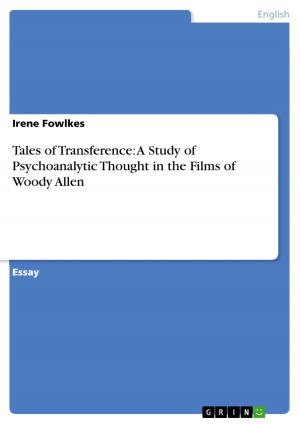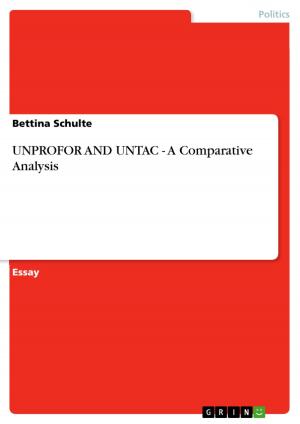| Author: | Frederik Kugler | ISBN: | 9783638549172 |
| Publisher: | GRIN Publishing | Publication: | September 26, 2006 |
| Imprint: | GRIN Publishing | Language: | English |
| Author: | Frederik Kugler |
| ISBN: | 9783638549172 |
| Publisher: | GRIN Publishing |
| Publication: | September 26, 2006 |
| Imprint: | GRIN Publishing |
| Language: | English |
Thesis (M.A.) from the year 2006 in the subject American Studies - Literature, grade: 1,0, University of Cologne (Amerikanisches Institut), 54 entries in the bibliography, language: English, abstract: In this paper, I will attempt a psychoanalytic reading of the male and the female in a selection of Tennessee Williams's plays. In my opinion, a psychoanalytic approach is the best way to do justice to Williams's disturbed characters and to explain the concepts of sex, gender, and culture that are inherent in each of his plays. The interrelation of these concepts will be of the utmost importance in the analysis ofThe Glass Menagerie(1945),A Streetcar Named Desire(1947),Cat on a Hot Tin Roof(1955),Orpheus Descending(1957),Suddenly Last Summer(1957), andSweet Bird of Youth(1959). However, before turning to the analysis of Tennessee Williams's plays, I will first delineate the concept of psychoanalysis as such. Since Sigmund Freud, who is conceived of as the father of psychoanalysis, psychoanalysis has come a long way, and even though it is today regarded as a somewhat conservative discipline, it still retains a disruptive attitude towards the conventional discourse of gender and sexuality. It furthermore has the capacity to undermine notions of fixed identity, including sexual identity, and although psychoanalysis may not be used as a method of treatment in clinical psychiatry anymore, it still proves successful when it comes to analysing the notion of sex, gender, and culture in literary texts, for instance. I will begin the paper with an outline of Sigmund Freud's essays on the three stages of psychosexual development of the child and give a brief account on the general workings of human sexuality. Via Freud's essays, I will show that sexuality is inextricably linked with modern Western society, and that sexual drives are repressed in order to guarantee the individual's entrance into society and culture. 'Seit Freud wird die [...] Entstehung und Funktion moralischer Motive im Individuum und in der Gesellschaft unter Berücksichtigung psychosexueller Entwicklungsphasen aus der Dialektik zwischen der Triebnatur des Menschen und seiner Gebundenheit an kulturelle und soziale Wert und Normsetzungen abgeleitet.'1Human sexuality then turns out to be a cultural product that is based on heterosexual behavior and procreation. Via these aspects, I will forge a link to Williams's disturbed characters, who fail to associate with normative sexuality. In order to further explore the connection of sex, gender, and culture, I will also take Jacques Lacan's contribution to psychoanalysis into consideration.
Thesis (M.A.) from the year 2006 in the subject American Studies - Literature, grade: 1,0, University of Cologne (Amerikanisches Institut), 54 entries in the bibliography, language: English, abstract: In this paper, I will attempt a psychoanalytic reading of the male and the female in a selection of Tennessee Williams's plays. In my opinion, a psychoanalytic approach is the best way to do justice to Williams's disturbed characters and to explain the concepts of sex, gender, and culture that are inherent in each of his plays. The interrelation of these concepts will be of the utmost importance in the analysis ofThe Glass Menagerie(1945),A Streetcar Named Desire(1947),Cat on a Hot Tin Roof(1955),Orpheus Descending(1957),Suddenly Last Summer(1957), andSweet Bird of Youth(1959). However, before turning to the analysis of Tennessee Williams's plays, I will first delineate the concept of psychoanalysis as such. Since Sigmund Freud, who is conceived of as the father of psychoanalysis, psychoanalysis has come a long way, and even though it is today regarded as a somewhat conservative discipline, it still retains a disruptive attitude towards the conventional discourse of gender and sexuality. It furthermore has the capacity to undermine notions of fixed identity, including sexual identity, and although psychoanalysis may not be used as a method of treatment in clinical psychiatry anymore, it still proves successful when it comes to analysing the notion of sex, gender, and culture in literary texts, for instance. I will begin the paper with an outline of Sigmund Freud's essays on the three stages of psychosexual development of the child and give a brief account on the general workings of human sexuality. Via Freud's essays, I will show that sexuality is inextricably linked with modern Western society, and that sexual drives are repressed in order to guarantee the individual's entrance into society and culture. 'Seit Freud wird die [...] Entstehung und Funktion moralischer Motive im Individuum und in der Gesellschaft unter Berücksichtigung psychosexueller Entwicklungsphasen aus der Dialektik zwischen der Triebnatur des Menschen und seiner Gebundenheit an kulturelle und soziale Wert und Normsetzungen abgeleitet.'1Human sexuality then turns out to be a cultural product that is based on heterosexual behavior and procreation. Via these aspects, I will forge a link to Williams's disturbed characters, who fail to associate with normative sexuality. In order to further explore the connection of sex, gender, and culture, I will also take Jacques Lacan's contribution to psychoanalysis into consideration.















